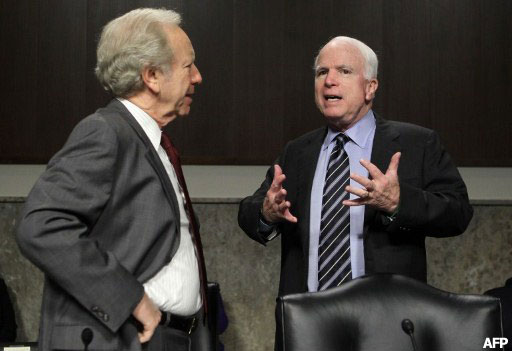Chiang Mai (Mizzima) – US Senator John McCain will meet with pro-democracy leader Aung San Suu Kyi and Burmese government authorities next week, sources say.
It is not yet certain what is on the agenda for the senator’s visit, but he is likely to meet with National League for Democracy (NLD) leaders on Thursday, June 2, according to sources.
The former presidential candidate has long been a staunch supporter of the pro-democracy and opposition movement in Burma, and he met with Aung San Suu Kyi while she was under detention in her home in the 1990s.
McCain has said that Suu Kyi has been the most impressive person he has ever met and called her ‘a woman that’s so remarkable, it’s hard for me to describe to you', the Associated Press reported in 2007.
McCain has repeatedly strongly criticized the Burmese military regime, especially following the violent crackdown on the Saffron Revolution in 2007. Following the brutal suppression of the peaceful demonstrations, McCain called for a ‘comprehensive international response’ to the crackdown in Burma and called the generals ‘thugs’.

‘And the thugs who run Burma have shown, once again, the true face of their tyranny. In crushing the Saffron Revolution, killing hundreds and jailing thousands– including countless Buddhist monks–the junta has left no doubt about its intentions. Nor should the world have any doubt about ours. We stand on the side of freedom, not fear; of peace, not violence; and of the millions in Burma who aspire to a better life, not those who would keep them isolated and oppressed’, he said in a statement said in October 2007.
He also called for the Association of Southeast Asian Nations (Asean) to cease making empty statements and revoke Burma’s position of membership in the bloc.
'The Association of Southeast Asian Nations should move beyond issuing statements and immediately convene an emergency meeting to expel Burma’, he said.
After Cyclone Nargis devasted the Irrawaddy Delta in 2008, McCain said, ‘We (also) need to put more pressure on this illegal, corrupt government in Burma to make them change’, The Irrawaddy Magazinereported in 2008.
McCain’s highly principled stance against the Burmese junta was tarnished, however, during his presidential campaign in 2008 when two of his aides resigned their posts after Newsweek magazine revealed their direct involvement in a public relations firm that represented the military regime.
In 2007, in his response to the junta’s suppression of the Saffron Revolution, a press release from McCain’s office stated, ‘The next phase of political life in Burma has begun. The junta's thugs cannot forever postpone the blossoming of freedom and democracy’.
Burma’s pro-democracy and opposition groups seem to be fond of bolder political advocates championing more candid approaches to the regime. After UN special envoy to Burma Vijay Nambiar ended a three-day visit to Rangoon this month, NLD spokesperson Ohn Kyaing told Mizzima:
'The US is a strong democratic country. I think it is the mother of democracy. So, the US special envoy to Burma can work more freely and actively than the UN special envoy…The US can help us more than the UN because it does not need to negotiate with other countries’.
US President Barack Obama nominated Derek Mitchell recently to be the first US special representative and policy coordinator for Burma, but his post has yet to be approved by the US Senate.
Mitchell is currently a principal deputy assistant secretary of defense for Asian and Pacific security affairs at the Department of Defense.w


